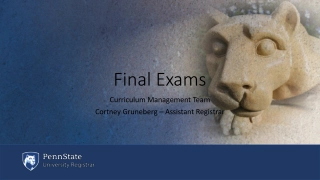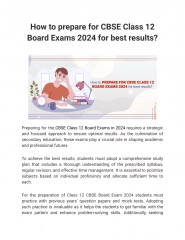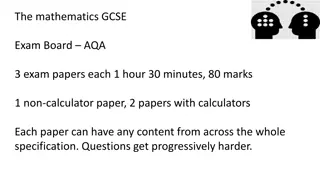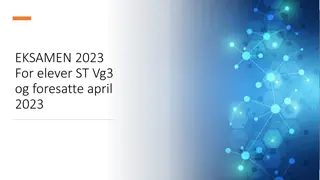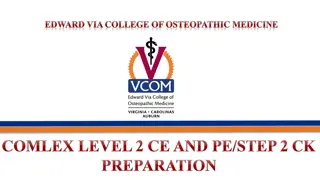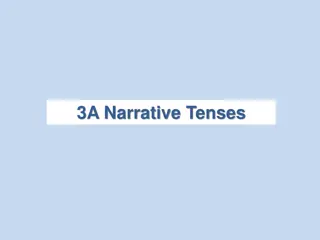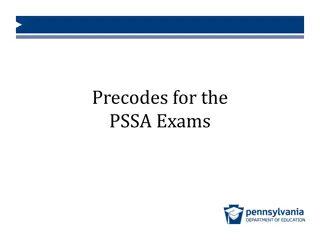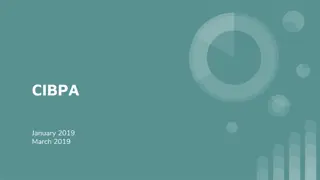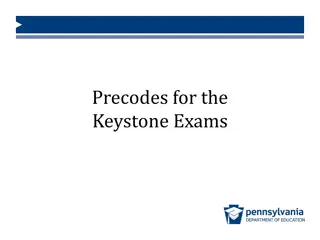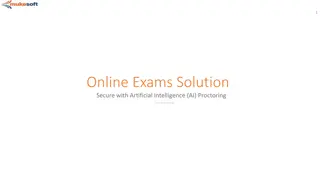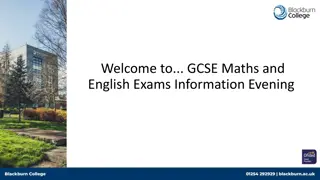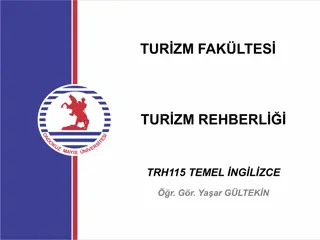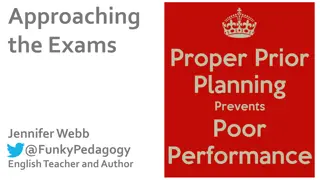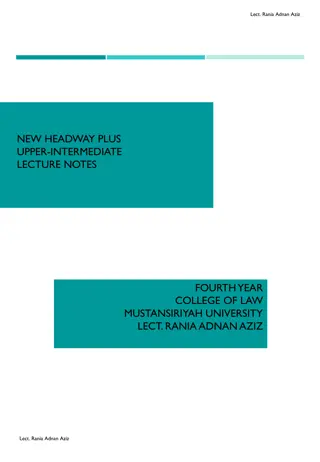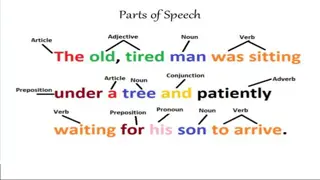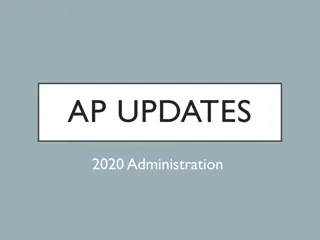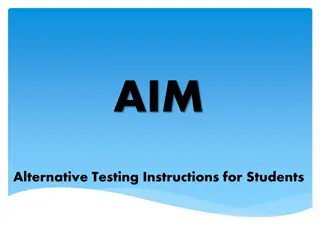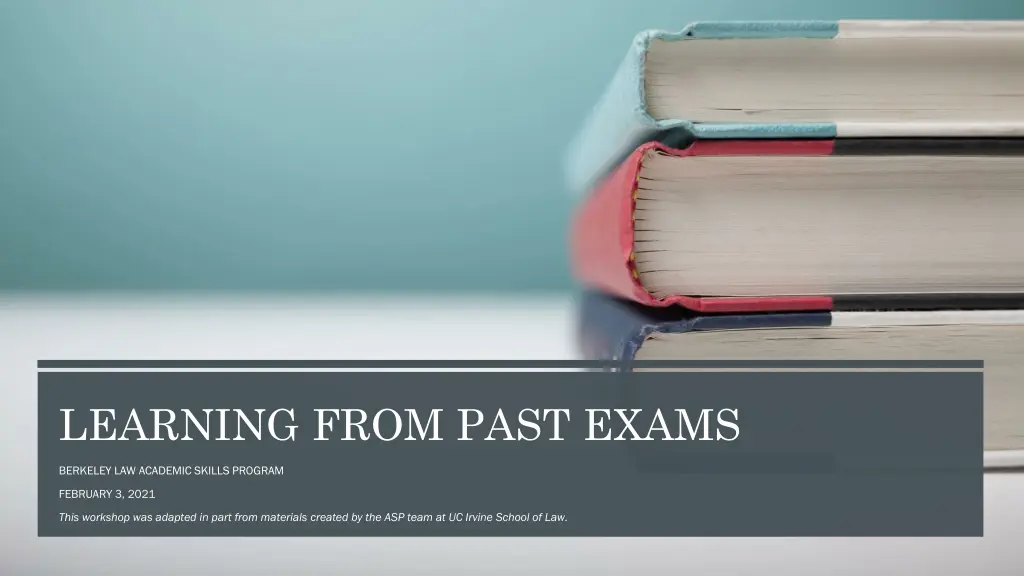
Exam Skills Workshop: Learning and Improving Techniques
Enhance your exam skills with this comprehensive workshop that focuses on self-assessment, meeting with professors, and adjusting study strategies. Learn to spot issues, know relevant rules, apply rules effectively, and improve writing techniques. Take charge of your academic success today!
Uploaded on | 1 Views
Download Presentation

Please find below an Image/Link to download the presentation.
The content on the website is provided AS IS for your information and personal use only. It may not be sold, licensed, or shared on other websites without obtaining consent from the author. If you encounter any issues during the download, it is possible that the publisher has removed the file from their server.
You are allowed to download the files provided on this website for personal or commercial use, subject to the condition that they are used lawfully. All files are the property of their respective owners.
The content on the website is provided AS IS for your information and personal use only. It may not be sold, licensed, or shared on other websites without obtaining consent from the author.
E N D
Presentation Transcript
LEARNING FROM PAST EXAMS BERKELEY LAW ACADEMIC SKILLS PROGRAM FEBRUARY 3, 2021 This workshop was adapted in part from materials created by the ASP team at UC Irvine School of Law.
FIRST THINGS FIRST LAW SCHOOL GRADES ARE A SNAPSHOT OF ONE MOMENT IN TIME; THEY DO NOT DEFINE YOU THERE IS NO CORRELATION BETWEEN LAW SCHOOL GRADES AND SUCCESS AS A LAWYER FOCUS ON SKILLS, NOT GRADES
TOOLS & MATERIALS: WHAT DO YOU NEED TO LEARN FROM PAST EXAMS? A copy of the exam A copy of your answer (with or without prof comments) If available, a model answer or exam memo Self-assessment worksheet (available on Academic Skills Program website) If possible, a meeting with your professor or, if not, with Senior ASP Fellow Haley Johnson Grit and resilience
THREE-STEP PROCESS 01 02 03 Self-assessment Meet with your Meet with your professor professor (if possible) (if possible) or ASP advisor or ASP advisor Adjust your study Adjust your study strategies strategies
STEP ONE: SELF-ASSESSMENT What can I do differently? What did I miss? Why did I miss it?
WHERE DID I MISS POINTS? For each of the following skills, assess where/why you missed points: Spotting the issues Knowing the relevant rules Applying the rules Conclusions Writing technique (organization, clarity, etc.)
Did I miss any issues? Did I miss any related issues (e.g., defenses)? SPOTTING THE ISSUES Approximately what percentage of the issues did I spot? Did I include any non-issues (i.e., issues not raised by the fact pattern)?
Did I state the correct rule, and did I state it accurately? Did I miss any sub-rules? KNOWING THE RELEVANT RULES Did I include unnecessary/irrelevant info? Did I include all relevant sources of law?
Responsiveness. Responsiveness. Did I tailor my answer to the call of the question? Factual detail. Factual detail. Did I discuss the relevant facts in detail? Inferences. Inferences. Did I explicitly state the inferences drawn from the facts? Counterarguments. Counterarguments. Did I include all the relevant facts? Did I mention and address possible counterarguments? APPLYING THE RULES Proportionality. Proportionality. Did I spend more time/space on sticky issues and less time/space on clear-cut issues? Efficiency. Efficiency. How much time/space was spent on unnecessary background material? Case comparisons. Case comparisons. Did I support my argument with case comparisons? Policy. Policy. Did I address any relevant policy considerations?
Clear and easy to read Sentence length no more than 2-3 lines WRITING TECHNIQUE: CLARITY Use of key terms use and repeat terms of art Use of transitions to signal logical relationships (however, nevertheless, in the alternative)
IRAC structure with mini-IRACS for sub-rules Headings WRITING TECHNIQUE: STRUCTURE Topic sentences Short paragraphs
STEP TWO: MEETING WITH YOUR PROFESSOR Know that your professors might not be able to meet individually with every student. Focus on identifying skills you can improve and implement in other classes. Keep an eye out for patterns of strengths and weaknesses.
Review your exam and conduct the self-assessment outlined above. A version with your professor s comments may be available through the law library. If not, review your personal copy. Isolate a representative portion of the exam for your professor s review. (You re unlikely to have time to review the entire exam.) HOW TO PREPARE FOR THE MEETING Use your self-assessment to create a short list of specific questions to ask and know why you are asking each question (e.g., Question: Did I use sufficient factual detail in my application/analysis? Why I m asking: This will help me understand whether my analysis is too conclusory.) Provide the professor with a copy of your exam and bring additional copy for yourself.
Be mindful of the professors limited time. Be clear that you are not there to dispute your grade. HOW SHOULD I APPROACH THE DISCUSSION? Take notes! Rephrase what you are hearing from your professor in your own words to make sure you understand what they are saying. End with a catch-all question: Do you have any other advice on what I can do to improve my legal analysis or exam writing? Send a follow-up email thanking the professor for their time.
STEP THREE: ADJUST YOUR STUDY STRATEGIES Using your self-assessment and your professor s feedback, for each missed point: (a) write down why you missed the point and (b) identify specific study strategies that you can adopt to avoid missing those points in the future. Rewrite the exam (or a portion of it) to test your understanding of the feedback and to practice the new approach. Practicing the new approach right away will help you learn it and be able to repeat it later. Create a schedule and concrete plan for implementing new strategies. Consult with ASP faculty and staff if you feel stuck. 1Ls: ASP Fellows All: Senior ASP Fellow Haley Johnson: https://DianaDiGennaro.as.me
SAMPLE SELF-ASSESSMENT CHART What did I miss? What did I miss? Missed an issue Why did I Why did I miss it? Ran out of time miss it? What can I do differently?* What can I do differently?* Develop a system for managing time; practice under time pressure Create a one-page checklist of issues Work with study group; check course outline against class notes Structure course outline differently Practice with feedback Missed an issue Incorrect rule Forgot about that issue Didn t know the rule Incomplete rule Incomplete analysis Incomplete analysis Incomplete analysis Course outline was not helpful Didn t include all relevant facts Too conclusory; insufficient factual detail Practice with feedback Too few case comparisons Structure outline to include cases; practice with feedback
February 8 at 1-2pm: Staying Motivated and Avoiding Burnout February 10 at 1-2pm: Rethinking Your Study Strategies SPRING ASP WORKSHOPS February 17 at 1-2pm: Exam Workshop March 31 at 1-2pm: Exam Workshop April 19 at 1-2pm: Exam Workshop
ASP individual meetings ASP Fellows labs, office hours, and feedback on practice questions OTHER RESOURCES CALI lesson: How to Learn from Exams (https://www.cali.org/lesson/18208) Student Services Berkeley Law staff psychologists Tang Center Psychological & Counseling Services

